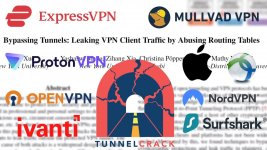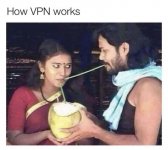d0ctrine
Diamond
- Joined
- 17.08.24
- Messages
- 107
- Reaction score
- 4,223
- Points
- 93

If your new to carding chances are youve fallen for the VPN hype. These are advertised everywhere promising digital invisibility and unbreakable security. Every YouTuber and their grandma is pushing some VPN service.
But heres the cold hard truth: VPNs arent the bulletproof vest you think they are. In fact for carders they can be more of a liability than an asset.
Im not saying VPNs have no use. If your trying to watch some geo blocked content or hide your furry porn habits from your ISP theyre fine. But for serious carding? You might as well be waving a red flag.
In this guide were going to bust the VPN myth. Well show you why using VPNs for carding is not only ineffective but can actually increase your chances of getting caught. Youll see why experienced carders ditched VPNs long ago and what theyre using instead.
So listen up. Its time to learn why your favorite VPN is the weakest link in your carding operation.
Disclaimer: The information provided in this write-up is intended for educational purposes only. It is a study of how fraud operates and is not intended to promote, endorse, or facilitate any illegal activities. I cannot be held liable for any actions taken based on this material. Please use this information responsibly and do not engage in any criminal activities.
Using VPNs when Carding
In the early days of carding, when residential proxies were as rare as a honest politician, VPNs were the go-to tool for digital disguise. Id use a VyprVPN, order a gift card from Amazon, and call it a day. Simple and effective. But those days are dead.
As fraud detection improved, the weaknesses of VPNs became glaringly obvious. The main issue? VPNs run on cloud servers, and these servers are about as clean as a gas station toilet. Every person looking to hide their online activities is using these same IPs. Its not exactly subtle.
But you might ask, why were VPNs working before? Werent they always this compromised? Good question. Before advanced analytics and device fingerprinting, sites had two choices when they saw a VPN user:
- Block the transaction and risk losing a legitimate customer
- Allow it and accept the loss if it turned out to be fraud
They typically chose the latter, as fraud was a relatively small zit on the ass of e-commerce back then.
Times have changed. Now, these sites have more data points to analyze. They can differentiate between a regular person using a VPN and someone attempting to card. Its all about patterns and behavior. A normal VPN user doesnt trigger alarms, but a carders activities will stand out.
So whats a clever carder to do in this brave new world? Abandon VPNs for carding like last weeks garbage. Your new weapon should be clean residential proxies. They not only provide better tools to match the cardholders location but also substantially increase your chances of success.
With a residential proxy, youre not just an anonymous cloud server. You appear as a regular person making a purchase. You blend in like a chameleon at a paint factory. And in carding, being indistinguishable from legitimate traffic is extremely important.
Remember, in this field, your tools determine your success. Currently, VPNs are about as useful as the checker on Vclub. Leave VPNs behind and use residential proxies, and youre likely to see improved results. Its about adapting to stay ahead in the game.
VPNs as an Anonymity Tool

VPNs are the darlings of the privacy world, with companies spending millions on influencer marketing to tell you their service is like an invisibility cloak. And theyre not entirely full of it. VPNs are good at hiding your traffic from prying eyes, whether its a hacker in a coffee shop, your nosy ISP or some automated system looking for torrenters.
But heres the thing: while VPNs can protect you from some threats, theyre not the impenetrable fortress of anonymity they claim to be. The dirty secret of the VPN world is that many providers are selling you a false sense of security, wrapped up in fancy marketing and BS.
Lets talk about the biggest lie in VPN marketing: the "no-logs" policy. Many VPN providers wave this around like a get-out-of-jail-free card. "We dont keep logs," they claim, "so we cant hand over your data even if we wanted to!" Its a nice story, but often thats all it is - a fucking fairy tale.
Take HideMyAss VPN, for example. These guys claimed to protect user privacy, but when the heat came down, they rolled over faster than a submissive in a BDSM dungeon. They handed over logs that led to the arrest of a LulzSec hacker. So much for "no logs", huh?
Or PureVPN? These guys helped the FBI catch a cyberstalker by giving him his real IP address. Their "no-log" policy turned out to be about as solid as wet toilet paper.
But its not all bad in VPN land. Some providers actually walk the walk when it comes to privacy. Mullvad, for example, has always stood up to pressure and kept their no-logs stance. When their servers were seized in Ukraine, the authorities came up empty handed. No logs, no data, no problem.
PrivateInternetAccess is another example of a VPN thats proven itself. When subpoenaed, they couldnt provide any user data because they didnt have it. Thats the kind of balls you want in a privacy service.
The takeaway? VPNs can be a good tool for anonymity, but you better choose wisely. At the end of the day, a VPN is only as trustworthy as the company running it. Some VPN providers are privacy warriors, fighting the good fight against surveillance and data collection. Others are wolves in sheeps clothing, ready to sell you out at the first sign of trouble.
If youre serious about your privacy (and if youre reading this, you fucking should be), do your research. Check out privacytools.io for up-to-date comparisons of VPN services. Remember, in the world of VPNs, not all heroes wear capes - some just have really good privacy policies.
VPN Flaws

Now that weve busted the VPN myth its time to face the harsh reality about their technical flaws.
WebRTC leaks are the silent traitors. This browser feature can bypass your VPN, exposing your real IP to any site smart enough to look. Its like wearing a mask but forgetting to cover your name tag.
DNS leaks are just as worrisome. Your VPN might encrypt your traffic but if it messes up DNS requests, youre leaving a trail straight to your doorstep. Its like using a burner phone but giving out your home address.
IPv6 leaks often go unnoticed. Many VPN providers are stuck in the IPv4 era leaving you exposed if your ISP supports IPv6. Your real IP could be broadcasting without you knowing it.
Then theres the malware threat. Remember HolaVPN? Users thought they were getting free protection, but instead became unwitting parts of a botnet. Its like hiring a bodyguard whos actually working for the enemy.
These arent hypothetical risks. Theyve led to real arrests of VPN users who thought they were anonymous. In the carding game this kind of mistake can get you cuffed.
These arent just theoretical concerns. Real-world cases prove the point. In 2017 a man was arrested for making bomb threats despite using a VPN. A combination of WebRTC and IPv6 leaks exposed his real IP address and he was caught.
Perhaps most worrying is how VPNs can actually decrease security when used with other privacy tools. Take the VPN over Tor scenario. While it might seem like doubling down on privacy, it actually increases your attack surface. Youre now trusting both the Tor network and the VPN provider so more points of failure. And using a VPN with Tor can nullify the benefits of Tors distributed trust model, centralizing your exit point and making traffic correlation attacks easier.
For carders, relying on VPNs is especially risky. The flaws weve discussed could easily expose you and turn your attempts at anonymity into a neon sign pointing right at you. In this game that kind of mistake can get you cuffed.
So before you hit that VPN connect button for your next carding session, pause and think. You might be better off exploring more robust purpose-built solutions for keeping your privacy and security online.
The biggest problem with VPNs isnt just the technical issues or the lies. Its the complacency they create.
Too many idiots think slapping on a VPN makes them invincible. They get cocky, sloppy and start taking risks theyd never take without that false sense of security. Its like thinking youre bulletproof because youre wearing a T-shirt with a shield on it.
This complacency is a carders death sentence. You start cutting corners on your OPSEC thinking your VPNs got your back. You reuse the same server, ignore other security measures and maybe even log into personal accounts while carding. Before you know it youve left a trail a blind cop could follow.
Remember this: a VPN is a tool and not a magic wand. It dosnt erase your mistakes or make you invisible. At best its one layer in a complex security setup. At worst its a crutch that will get you caught.
So wake the fuck up. Ditch the VPN dependency. Focus on building a robust, multi layered approach to your operations. Because in this game complacency isnt just dangerous - its fatal.
Stay sharp, stay paranoid and never trust a single point of failure. Thats how you survive in this world. d0ctrine out.
Last edited:



